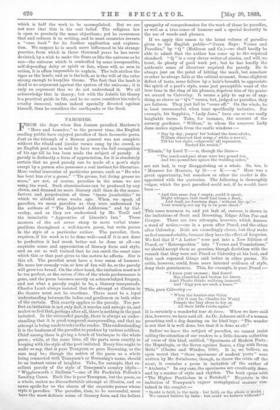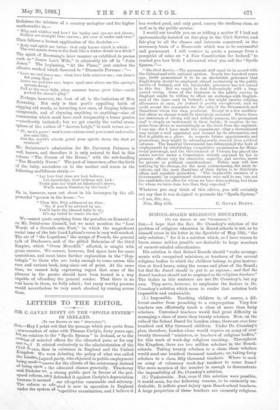PARODIES. F ROM the days when Ben Jonson parodied Marlowe's "Hero
and Leander," to the present time, the English reading public have enjoyed parodies of their favourite poets. Just as the triumph of a Roman general was not complete without the ribald and jocular verses sung by the crowd, so no English poet can be said to have won the full recognition of his age till he has been made the subject of parody. A parody is distinctly a form of appreciation, for it is absolutely certain that no good parody can be made of a poet's style except by a person who possesses a real instinct for literature. Mere verbal travesties of particular poems, such as "He who has bent him o'er a goose," " 'Tis grease, but living grease no more," are not, of course, parodies in the sense we are using the word. Such abominations can be produced by any clown, and demand no more literary skill than do the manu- facture and perpetration of those "inane jocularities" to which we alluded some weeks ago. When we speak of parodies, we mean parodies as they were -understood by the authors of "The Rejected Addresses" and by Cal- verley, and as they are understood by Mr. Trail and the inimitable "Apprentice of Lincoln's Inn." These masters of the art never stoop to mere verbal trans- positions throughout a well-known poem, but write poems in the style of a particular author. The parodist, then, requires, if his work is to be done well—and if it is not done to perfection it had much better not be done at all—an exquisite sense and appreciation of literary form and style, and an ear so well trained that he can catch the exact tone which this or that poet gives to the metres he affects. Nor is this all. The parodist must have a true sense of humour. No mere low-comedy vein or love of fun will do, or the parody will grow too broad. On the other hand, the imitation must not be too perfect, or the raison d'être of the whole performance is gone, and the poem becomes merely an acknowledged forgery, and not what a parody ought to be, a literary masquerade. Charles Lamb always insisted that the attempt at illusion in the theatre must not be overdone. There must be a loyal understanding between the ladies and gentlemen on both sides of the curtain. This exactly applies to the parody. Too per- fect an imitation is not only dull, it worries and annoys us, and makes us feel that, perhaps after all, there is nothing in the poet imitated. In the successful parody, there is always an under- standing that it is good-tempered masquerading, and that no attempt is being made to take in the reader. This understanding it is the business of the parodist to produce by various artifices. Chief among these is giving a touch of burlesque to the whole poem ; while, at the same time, all the parts seem exactly in keeping with the style of the poet imitated. Every line ought to make us say, that is pure Tennyson or pure Browning, as the ease may be ; though the notion of the poem as a whole being connected with Tennyson's or Browning's name, should be an instant cause of laughter. Take, for example, that ex- cellent parody of the style of Tennyson's country idylls- " Wigglesworth v. Dallison "—one of Sir Frederick Pollock's Leading Cases. Each line is pure Tennyson, but the poem, as a whole, makes no discomfortable attempt at illusion, and so never spoils for us the charm of the exquisite poems whose style it parodies. The parodist, then, to be successful, must have the most delicate sense of literary form and the fullest sympathy of comprehension for the work of those he parodies, as well as a true sense of humour and a special dexterity in the use of words and phrases.
If we apply this canon to the latest volume of parodies given to the English public—" Green Bays : Verses and Parodies," by " Q " (Methuen and Co.)—we shall hardly be able to admit that the author has come up to the required standard. " Q " is a very clever writer of stories, and will, we trust, do plenty of good work yet ; but he has hardly the authentic sense of literature required for parody. He is always just on the point of hitting the mark, but somehow or other he always fails at the critical moment. Some slightest defect of taste, some failure by a hair's-breadth to appreciate the spirit of a poet's style, some just perceptible want of the- true tone in the ring of his phrases, deprives him of the praise we accord to Calverley. It seems a pity to say so of any- thing so clever as " Q's " verses, but, judged as parodies, they are failures. They just fail to "come off." On the whole, he is least unsuccessful when least specifically imitative. For example, his Sapphics, Lady Jane," have one or two really laughable turns. Take, for instance, the account of the nursery gardener, " Willum," to whom the amorous Lady Jane makes signals from the castle windows :— "Day by day, peepin' fro' behind the bean-sticks, Walla observed that scrap o' white a-wavin', Till his hot sighs, outgrowm' all repression, Busted his weskit."
"Titania," by Lord T—n, though the lines— "The coach-and-pair alone were two pound ten, And two-pound-ten apiece the wedding-cakes," are not bad, is very disappointing as a whole. So, too, is "Measure for Measure, by 0—r K—m." Here was a great opportunity, but somehow or other the reader is dis- appointed with the quatrains. The following is thoroughly vulgar, which the poet parodied could not, if he would, have been :— " And this same Jug I empty, could it speak, Might whisper that itself had been a Beak,
And dealt me fourteen days, ' without the op,'— Tour worship see my lip is on your cheek."
This same nearness to, and yet lack of, success, is shown in the imitations of Scott and Browning, Edgar Allan Poe and Cowper. There are two attempts, however, which deserve a word of notice,—one is a poem after Pined, and the other after Calverley. Both are exceedingly clever, but they make us feel uncomfortable, because they have the effect of forgeries. We feel that if" A Letter" were put into a New Edition of Praed, or " Retrospection " into "Verses and Translations," we should accept them as genuine, though doubtless with the remark that they were not Praed or Calverley at his.best, and that each repeated things said better in other poems, No critic, however, could, from mere internal evidence of style, deny their genuineness. This, for example, is pure Praed :— "I know your excuses : Red Sorrel
Has stumbled and broken his knees. Aunt Phcebe thinks waltzing immoral, And • Algy you are such a tease.'"
This, pure Calverley :— "When the hunter-star Orion (Or it may be, Charles his Wain) Tempts the tiny elves to try on All their little tricks again."
It is certainly a wonderful tour de force. When we have said this, however, we have said all. As Dr. Johnson said of a woman preaching and a dog dancing on its bind legs "The wonder is not that it is well done, but that it is done at all."
Before we leave the subject of parodies, we cannot resist calling the attention of our readers to a little-known collection of verse of this kind, entitled, "Specimens of Modern Poets : the Heptalogia, or the Seven against Sense, a Cap with Seven Bells" (Chatto and Windus, 1880). It is, we believe, an open secret that "these specimens of modern poets" were written by Mr. Swinburne, though, to throw the critic off the scent, it contains a poem in imitation of the author of "Atalanta." In any ease, the specimens are excellently done, and by a master of style and rhythm. The book opens with "The Higher Pantheism in a Nutshell." Exquisite is the imitation of Tennyson's vaguer metaphysical manner con- tained in the couplet :— " Doubt is faith in the main : but faith on the whole is doubt We cannot believe by faith : but could we believe without ?" Delicious the mixture of a country metaphor and the higher mathematics in,—
Why and whither and how ? for barley and rye are not clover ; Neither are straight lines curves ; yet over is under and over."
'Then follows a human application of the doctrine :— " Body and spirit are twins : God only knows which is which : The soul squats down in the flesh like a tinker drunk in a ditch." The spirit of Browning's later manner as exhibited in poems such as "James Lee's Wife," is admirably hit off in "John Jones." The beginning, "At the Piano," just catches the allusive method which flowered in "Dramatis Personm : "— " Love me and leave me ; what love bids retrieve me ; can June's fist grasp May ?
Leave me and love me ; hopes eyed once above me like spring's sprouts decay. ; Fall as the snow falls, wheu summer leaves grow false—cards Packed for storm's play."
Perhaps, however, the best of all is the imitation of Mrs. Browning. Not only is that poet's appalling habit of clipping old words, or inventing new ones, of forging hideous compounds, and of rhyming anything to anything—sins of commission which must have sunk irreparably a lesser genius --excellently imitated ; but we get exactly the verbal atmo- sphere of the author of "Aurora Leigh," in such verses as :— "Au, men's poets ! men's conventions crust you round and swathe you mist-like,
And the world's wheels grind your spirits down the dust ye overtrod."
Mr. Swinburne's admiration for Mr. Coventry Patmore is well known, and therefore it is only natural to find in this volume "The Person of the House," with the sub-heading " The Monthly Nurse." The poet of innocence, after the birth of the baby, maunders on to the mother and nurse in the following mellifluous strain 1— "Let love that does not look believe;
Let knowledge, that believes not, look : Truth pins her trust on falsehood's sleeve, While reason blunders by the book."
Re is, however, soon out short in his harangue by the all. powerful "person in the house : "- 'r Then Mrs. Prig addressed me thus : Sir, if you'll be advised by me, You'll leave the blessed babe to us ; It's my belief he wants his tea."
We cannot quote anything from the paredies on Rossetti or 'on Mr. Swinburne himself, but we must mention the "Last Words of a Seventh-rate Poet," in which the magnificent social tone of the late Lord Lytton's verse is very well mocked. The air of "the Legations," the scraps of French, the general talk of Duchesses, and of the gilded Bohemias of the third Empire, which "Owen Meredith" affected, is caught with great success. We cannot, however, find space here for more quotations, and must leave further exploration in the "Hep- talogia " to those who are lucky enough to come across this rare and curious book, long since out of print. At the same time, we cannot help expressing regret that some of the Phrases in the poems should have been turned in a way capable of offending the general reader. That there is no real harm in them, we fully admit ; but many worthy persons would nevertheless be very much shocked by coming across them.



































 Previous page
Previous page